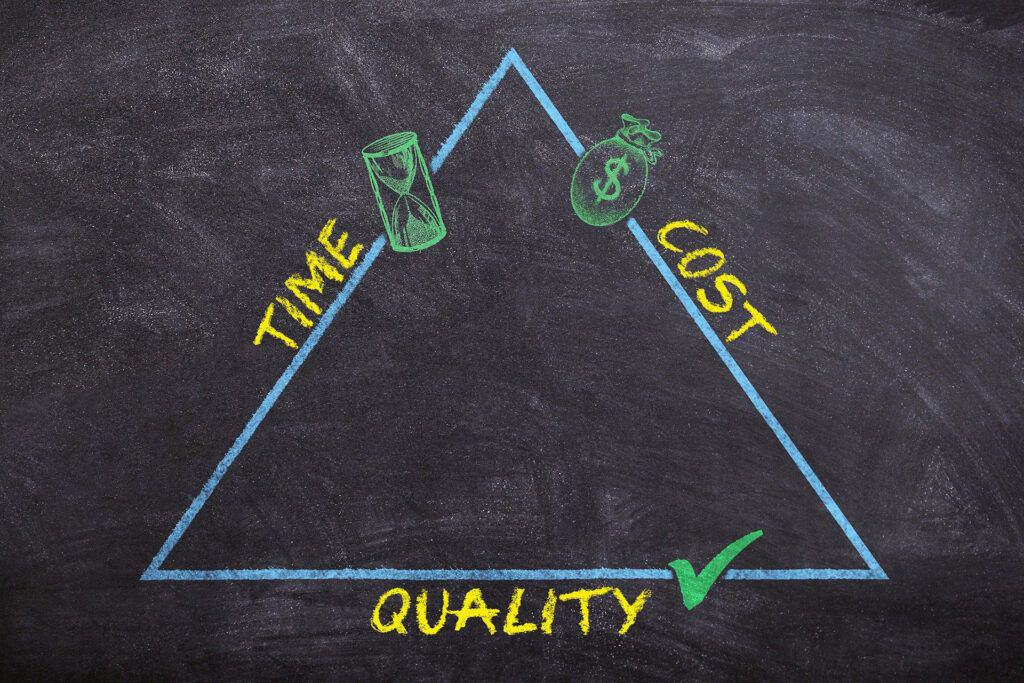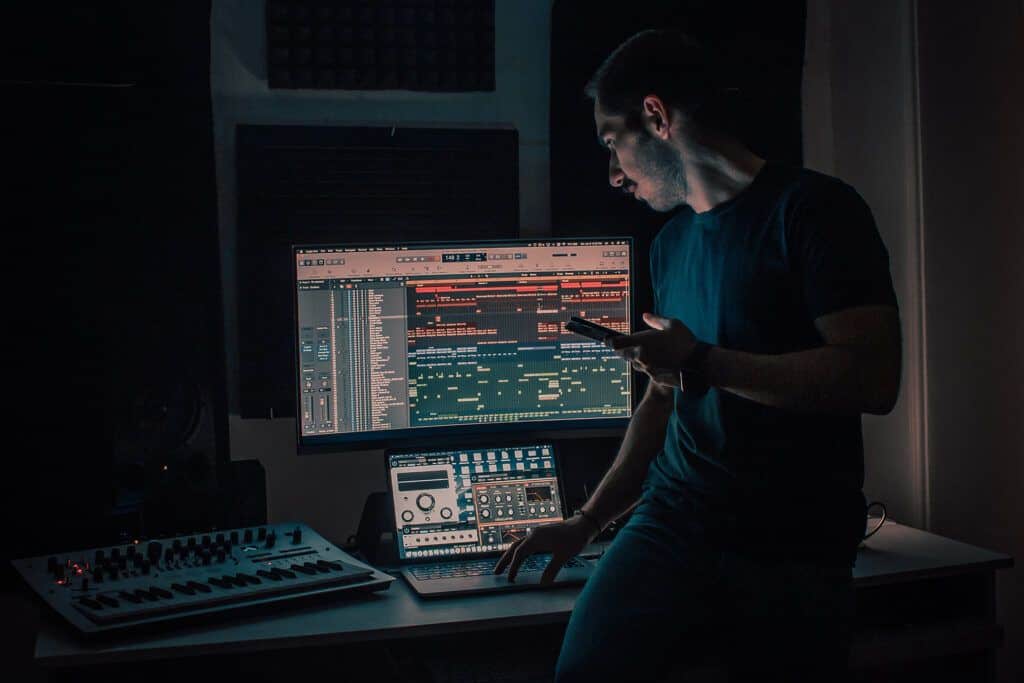How much to charge for a musical production?
How much to charge as a music producer or engineer is not an easy question to answer, as there is no standard price, but there are many factors that can influence it. But like any product or service, the first variable to take into account is always the market value.
However, in music production or recording studios there is no applicable Supply and Demand Law. The market price is important, yes, but the personal added value is more important, that is, the person who does the work, whose empathy and professionalism will be vital in the final decision of the client.
But before learning strategies to know how much to charge as a music producer and setting prices, let’s first see what factors intrinsic to music we have to take into account, in order to do so in a fair way for us and our client.
Determining factors for the price of a musical production
In this first chapter we will see what are the factors that you will have to take into account to set the price of your services as a music producer. I will also give you some first keys to establish rates according to your knowledge and experience.
If you are a beginner, perhaps at first setting a price is not the most important thing, but having the opportunity to gain experience, especially if it is next to someone relevant. If you have to work as runner, we can do it, but it’s better to do it for someone who is worthwhile.
But if you have been in this for some time, and you want to make a career on your own, these are the five factors that you should take into account to know how much to charge as a music producer.

Studies or skills
A part of your value is your knowledge, studies, acquired skills or degrees, which in certain jobs more at the institutional or company level will ask you to certify your level before offering you a job.
But in the end, no matter how many titles you have or YouTube tutorials that you have seen, if a guitarist comes to the studio and you don’t even know where to put the mic, well… What are you going to charge? If the one you would have to pay is you, hahaha
Professional value and experience
If you are no longer a beginner, you should be able to fairly assess your professional quality in order to establish a reasonable price. Sometimes a lack of experience can make you overestimate your own abilities, just as the incompetence of many clients will make them unable to recognize yours.
In any case, someone with experience will always charge more than a beginner. But I recommend you read this article about the four phases of knowledge. Recognizing which of the 4 phases you are in will undoubtedly help you better assess how much to charge for your services as a music producer.
Personal brand
In our world of music, personal branding is one of the important factors when it comes to our assessment as music producers or engineers. If the day comes when a client wants you, yes or yes, the price will be a relative and elastic value.
Building a personal brand and a good portfolio of clients takes years of work and dedication, and above all, a continuous training in music production.
But sometimes it just depends on a single success, and that can happen early in your career. And once … “the flute plays”, everything changes forever, and sometimes you even die from so much success.
Equipment or outboard gear
This is one of the most determining factors for the price. Logically you will not charge the same if you have a Telefunken U47 between your microphone, than if you only have a Shure SM58, or if you mix with an SSL 4000 versus “In the box” “with Ableton or Cubase.
This looks like the whiting biting its tail. If you do not have a good cache, you will never be able to buy quality material, but if you ask too much for having such equipment, it will be more difficult for you to get customers. Anyway… everyone invests in what they believe, but I think that investing in the purchase of good material is never wasting money.
Market and Competition
Analyzing the competition is one of the keys that will make you arrive faster at calculating how much to charge as a music producer. It is important to set a price according to the market, yes, but be careful, not always.
Sometimes it is better to work on fewer projects, better paid, and to be able to dedicate more time to them, to finish them better and generate more personal brand. Each one has to choose .. Or few many or many few?
Summary
Putting a price on our services as a music producer is not easy, based on the fact that basically we would all do it for free, because we do what we like and that they pay us on top of it is almost a privilege, hehe…
But of course, living costs money, and we also carry out an economic activity that generates expenses and taxes, so you have to charge. Factors to take into account to set said price would be: the level of knowledge, the professional value and personal brand, the team, and finally the price set by the competition.
6 decisive steps to set the price of a music production, mix or mastering
In this second chapter I will tell you a little more about economics and marketing, and the steps to follow to set the price of a musical production. I will help you know what to charge as a music producer, recording engineer, mixing or mastering from a more business point of view
Well, let’s get serious, and talk less about art and skills, and more about economics and marketing, since a large part of the recording studios that are set up new disappear or are transferred, not due to lack of knowledge or work, but due to failures in management.

In order to set the price of a musical production or mix, it is important to follow these 6 steps:
1Assess fixed and variable costs
Your knowledge of music production will allow you to perform different tasks, from making a beat or a song, to producing it in full and mixing it.
You should try to put a price on each one of them, but also add the amount of other fixed costs such as: the rent of the studio premises, the cost of equipment (leasing, loans, etc…), electricity, water and alarm costs. local, and even have a remnant for unforeseen events, such as breakages, breakdowns, etc…
You have to treat your business like a real company. At the end of the day you exercise an economic activity, and sooner or later you will have to regulate it and pay taxes for it, everything comes.
2Include your salary as a producer in the price
We would all do this job for free because it is doing what we love and love. Perhaps that is why many producers shy away from valuing themselves or putting on a salary. But your recording studio is not an NGO, and nobody will pay the electricity, or the water, or the rent of the premises for you, right?
You deserve to receive a decent salary for your work, so you have to put a monthly payroll on yourself, and pass this cost on to all your services.
3Rate better your best services
You have accumulated a lot of knowledge and you know how to do everything, Congratulations!. However, a musical production goes through many stages, and there will always be some of them where you perform better than others.
Put a higher price on these to gain brand, and compensate with a lower price in the areas that you dominate the least, so that you get more jobs and end up mastering them at the same level as the others.
4Identify what makes you unique
You may be the only Japanese-speaking music producer in all of Spain, or you may be the only sound engineer who has an original AKG C12 among his stock of microphones.
Identifying what makes you unique and what your added value is will not only help you to better establish your customer target, but also to be able to charge more for certain services.
5Communicate better why they have to choose you
It is important to identify what makes you special, but even more to know how to communicate it and choose the correct channel to do it. Always put yourself in the customer’s shoes, and think that it would give you security when hiring you, especially if your price is a little higher than that of the competition.
6We deal with people not robots
Having unique hardware in your city, or being the best at something, makes things easier when setting prices. But another intangible value is our attitude as people, including the infinite patience that our work sometimes demands.
The experience of any artist in our studio will always speak for us. You have to be diligent at work, yes, but we work with artists, people who sometimes doubt everything, and who sometimes change their minds from one minute to the next. We are creating music, making art, not riding a car or laying bricks in a work.
Our attitude towards problems and our relationship with artists could do more to raise our price than to buy the best compressor on the market. And the day will come when someone values more working with you even if you are more expensive, for the help and security that you offer. Everything will depend on you and your attitude!
Summary
Putting a price on our services as a music producer is not easy, and basically we would all do it for free, because doing what we like and getting paid is almost a privilege, hehe…
But you must treat your business like a company and learn to value your work. You are not a non-profit organization, and the product you help make will end up selling the market for a price.
The cost of your services should include your fixed and variable expenses and cover the unforeseen.
You must assess each service and identify what makes you unique, as well as your added value as a producer, and learn to communicate all this better to your potential clients.
And remember that we work with people, and sometimes our worth and the personal ties we establish will make customers forget about the price, even if it is more expensive than the competition.
General music production and mixing fees
In this last chapter I will talk to you more specifically about what price to put on your services, and above all about the danger of not valuing your work in its fair measure, and how to charge cheaper or below the market price in your area, you can influence the future and even lead to failure.
You will say that I have only talked to you about how to put prices, factors, and even marketing, but I have not answered the big question… How much to charge as a music producer for a music production?
But in case you haven’t noticed, you are on the blog of a recording studio and music producer in Barcelona of which I am the owner. You can see my music production rates and mixing rates by clicking on the links.
Please note that my prices are based on my experience composing, producing and arranging records on my own for over 30 years.
But you don’t need my resume either, just take these prices as a reference, or those of any other study in your area, city or country of origin, as a guide to what a professional charges, and set your price based on the comparison.

Consequences of charging cheap for a production
When you are a beginner there is a tendency to charge below the market price, sometimes due to ignorance, and others to be able to compete with other professionals.
We have all done it at some time. But let me tell you why it is a mistake, and why you should not charge cheap for a musical production.
Cheap is always expensive
Anyone deduces that behind a service at a price below the market, there is always a person with less experience, or less knowledge, or who does not have a job, which is sometimes a consequence of some of the previous two.
So if you charge cheap just to get started, change your technique, and instead make some kind of offer or follow another commercial strategy, instead of putting a price below that of other professionals in your area.

Well, fast and cheap does not exist
There are three variables that are taken into account in economics when setting prices: Time, Cost and Quality, and only two variables can coexist at the same time, or in other words:
- If a service is fast and cheap, its quality will be poor or poor.
- You are looking for something fast and of quality, surely it will not be cheap because it will need the participation of more people.
- And if what you need is a service that is cheap and of quality, surely it will not be fast and you will have to wait to receive it.
Therefore, if your service is cheap, it will be because some of the other two variables fail… It could just be that you prefer to keep a low price in exchange for a sustained workload, and customers who are willing to wait for you. But it is easier to think that if you charge cheap, it is only because the quality you offer is not good.
Charging cheap is not sustainable over time
Charging cheap is not sustainable over time If your clients have always paid X for your services, whether you do it wrong or do it well, it is very difficult for them to agree to pay more to get the same or a little better when the time comes.
If they can afford more, they will be tempted to try other professionals who have always been in the same price range.
But it is also that charging cheap will damage your future. If my personal experience serves you, 10 years ago I was charged 4 times more than what is charged now for some jobs. And that’s because in their day, those who succeeded me decided to accept a lower price in exchange for working, and that lowered the salary of the entire profession forever.
Alternatives to charging cheap for a musical production when you are a beginner
Everyone has the right to work, and it is also the only way to learn. You learn to produce by producing, to record by recording, and to mix by mixing, there is no other choice.
But before working for cheap it is preferable to work for free in exchange for experience, if you can afford it. Airplane pilots pay for their flight hours because without them they would never become pilots. Well, our case is not very different.
These are the strategies you can follow to avoid charging cheap and gain experience as a music producer:
- Start working for friends. You will gain experience and you will be able to learn without the pressure of having to do it perfect.
- If it is a job for a client, make it clear that you charge cheaper just because you do not have demonstrable experience, but that in reality your knowledge is many and demonstrable.
- Rate your work by the hour, in this way the client can evaluate your professionalism, and decide if it is worth continuing, knowing that it can stop at any time.
- Get paid in some way other than money. Below I give you some ideas.

Alternative ways to get paid as a music producer
There are alternative ways to charge a musical production that have always been there, but that new technologies have expanded and made more available to us. These are some of them:
Collect with copyright
We are many composers who like me, when placing songs, we decide to give up the production money, and instead receive only the copyright. In media like television sometimes there is no other possibility than to give in, it is what there is. But with respect to artists, depending on who it is, it can be worth it.
Another similar case is that of an artist who comes to your studio to record a song but does not have much money. If the artist is worth it, you can negotiate a price reduction with him in exchange for a percentage of the subject’s copyright.
Do not charge and own the editorial rights
Another option would be the case of an artist with several themes, who needed a complete production but did not have money. If we really see that he is a potential crack and we are interested, we could negotiate with him to pay for the entire production at our expense, in exchange for a percentage of copyright and editorial rights.
In Spain, the Intellectual Protection Law does not allow composers to assign more than 50% of the editorial rights to an editor. But in the US this percentage can be up to 100% of the total, although the concept is a little different from how it works in Spain, and explaining it gives for another post.
Do not charge and own the master
Another option, continuing with the previous case, would be to carry out the complete production in exchange for being the owners of the final master.
Being the owner of the master means being the owner of the oranges that a supermarket sells, and the owner of the oranges is the one who receives the money generated by their sale. In our case, the oranges are the physical support or master that houses the music, and the owner, who takes the earnings from listening to Spotify, visits on YouTube, etc …
Surely you have heard that many celebrities are selling the rights to their songs for hundreds of millions of dollars lately, right? Well, what they have sold for so many millions are precisely their editorial rights, since their masters are in the hands of record companies.
Summary
In this blog you have rates that will serve as a reference, although look at what the professionals in your area charge to be able to set rates according to your services, equipment you have, knowledge and previous experience.
Always value your work, treat your business as your own company, and never charge below the market price, not only because it will give a distorted image of your professional worth, but because it is not sustainable, it will not really benefit you in the future, and you could even damage your profession forever.
Instead, it is preferable to work for free for friends to learn, or if it is for a client, make it clear that the low price only responds to your lack of experience, means or that you are new in the area, but not because you lack knowledge or you don’t know how to do your job well.
There are also alternative ways to charge for your services without money involved, such as charging with copyright, signing the editorial rights with your publisher, and even taking over the production in exchange for being the owner of the master.
Conclusion
To know how much to charge as a music producer or sound engineer, consider the following factors:
- Look at what other professionals in your area, region or country charge for your same services.
- Assess whether it is more important for you to collect money or gain experience.
- Never stop studying, the more you know the more you can ask for your work.
- Learn to objectively assess your level as a product or an engineer, and don’t overestimate your own abilities.
- Try to build a personal brand, and never stop pursuing success, because opportunities will come to you.
- A good team equates to a better cache. But evaluate your investments well and think if you are going to amortize them before making them. Your studio is your company.
- Decide if you are one of the very few, or the few many, or of those in between, I’m doing well.
- Add to the price of your services the fixed and variable expenses of your activity as a producer.
- Treat your recording studio and your career like a company, and learn to value your work and charge for it, because you are not an NGO.
- Find what makes you unique, and enhance it to differentiate yourself from the rest.
- Find what makes you unique, and enhance it to differentiate yourself from the rest.
- Be diligent in your work and a bit of a psychologist with artists. Cultivate empathy, good humor and patience in the face of problems.
- It is preferable to charge free in exchange for experience than to charge cheap to a customer.
- Take into account other alternatives to money to pay for your services, such as copyright, editorial rights or ownership of the master.



